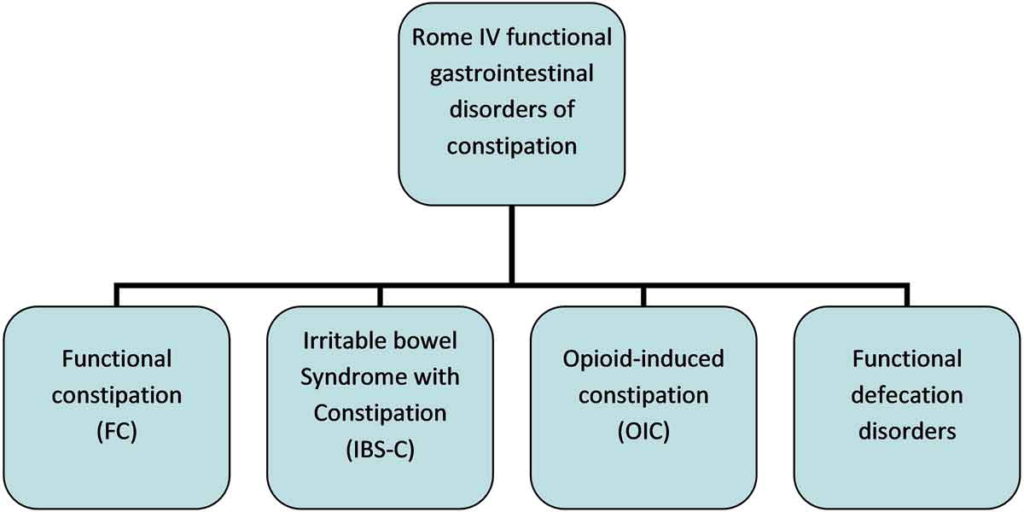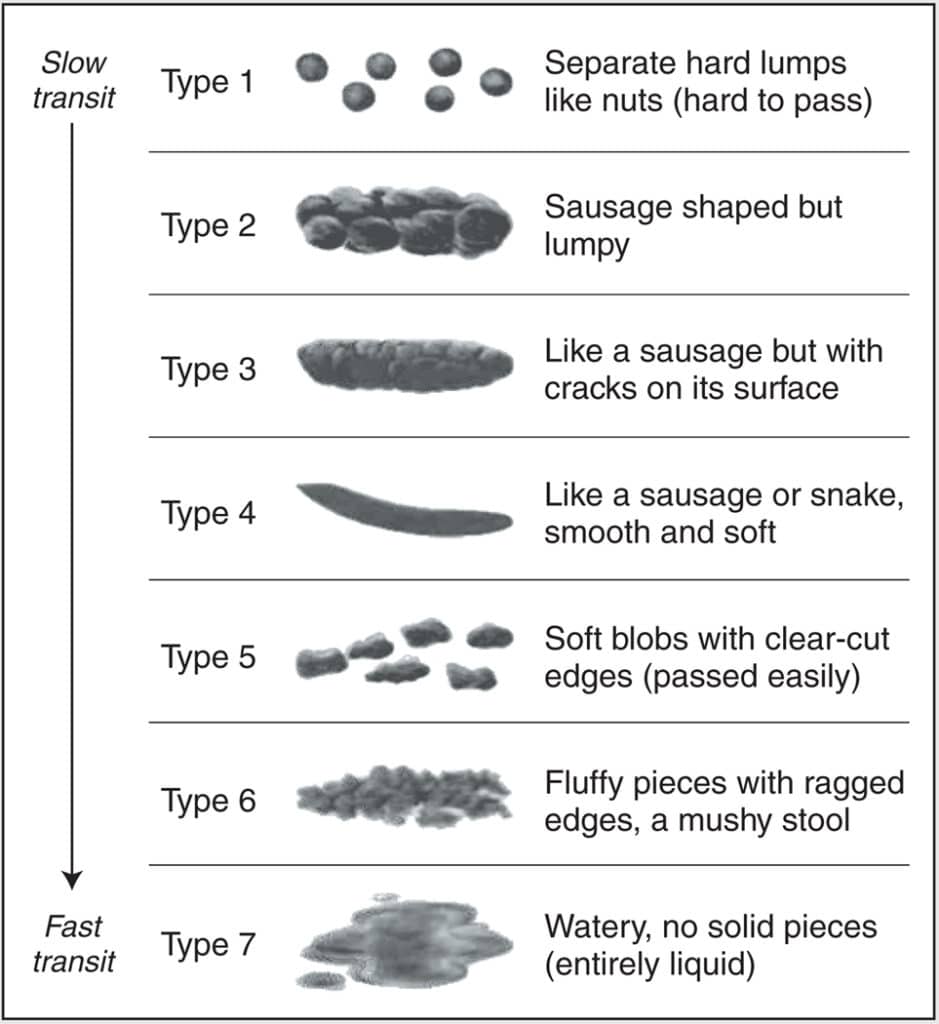Are you full of shi*?: Chronic Constipation and Your Body

Yes, literally. For much of my life, my most common complaint was constipation. It was the primary symptom of my celiac disease and Hashimoto’s thyroiditis. But, what’s the big deal? So many people are constipated. In fact, 10-15% of the population is constipated. (1) And yes, occasional constipation can happen and probably happens to most of us. However, there are different classifications of constipation. Symptoms must persist for the last 3 months with an onset of at least 6 months. And at that point you might be thinking, “Why am I always so constipated and bloated?” Well, the following classifications are identified in the image below. (1) Read further to understand the effects of constipation on the body.
Rome IV Disorders of Chronic Constipation

Figure 1.
For the purpose of this blog, I will focus on functional constipation and the effects of it on the body. This is the population that does not meet the diagnosis criteria for irritable bowel syndrome (IBS). Functional constipation is identified by the following criteria (1):
- Straining more than 25% of defecations
- Lumpy or hard stools (Bristol Stool Form Scale type 1 or type 2, Figure 2.) more than 25% of defecations. Refer to chart below to determine if you meet the category for type 1 or type 2 stool consistency.
- Sensation of incomplete evacuation more than 25% of defecations.
- Sensation of anorectal obstruction/blockage more than 25% of defecations.
- Manual maneuvers to facilitate more than 25% of defecations.
- Fewer than 3 spontaneous bowel movements per week.
The Bristol Stool Form Scale

Figure 2.
How to Use the Bristol Stool Form Scale
This chart can be used as a guide for monitoring the consistency of your stool. You can also maintain a journal to determine if your bowel function meets the criteria for functional constipation. That is three bowel movements per week, need to use manual aid to defecate, straining, sensation of obstruction or incomplete stool and lumpy or hard stools. This journal can be helpful to you when preparing for your next doctor visit. Being informed about how your body functions is the best way to advocate for your health. It is also important to note that constipation may present with other symptoms. Don’t rule out constipation if you do not meet all of the criteria above. So, what are those symptoms? Additional symptoms may include bloating, nausea, acid reflex, back or bladder pain, headaches and stress. 
Common Symptoms & Effects of Constipation on the Body
You might be constipated if you are bloated.
The bloat – this symptom is the main motivator for many of my clients to seek treatment. No one wants to feel 6 or 9 months pregnant when you are not. The heavy feeling in your gut or the inability to zip up those favorite pair of jeans may be a sign that your intestine isn’t emptying out as regularly as it should. If the bloat is accompanied with smelly toots, then food is hanging out in the large intestine longer than necessary. You will feel like you’ve lost 20 pounds once you regulate your digestion. Reducing calories and choosing diet food will only exacerbate your dysfunctional gut and decrease your chances of resolving the primary issue: constipation.
You might be constipated if you feel nauseous.
Have you ever described your gut as being “backed up”? This description is the perfect way to sum up what is happening. When you’re constipated, food particles are hanging out in the large intestine and when over filled can back up in the small intestine. This traffic jam can lead to nausea. It can also lead to methane dominated SIBO. SIBO is the overgrowth of bacteria in your small intestine resulting in methane gas production and constipation.
You might be constipated if you have acid reflux.
Similar to the nausea scenario, acid reflux can result due to constipation. The direct cause of the acid reflux may vary from sphincter relaxation to a food sensitivity. Either way, an acid reducer is not the best resolution for this discomfort. Acid reducers are just a band aid to the root cause. If you have acid reflux, the first step is to regulate your bowels. The second step is testing for food sensitivities and SIBO. The third step is addressing the leaky gut. Who knows what comes first? It’s the chicken or the egg situation. However, food sensitivities and SIBO are often intertwined with acid reflux.
You might be constipated if you have back or bladder pain.
The intestines are anatomically located adjacent to your bladder and back. A full intestine may create pressure leading to muscle or nerve discomfort in nearby areas. 
You might be constipated if you have headaches.
The most common cause of a headache is dehydration. Sometimes, the headache is caused by constipation due to dehydration. Check your water consumption. If you meet your daily fluid requirements, then the problem might be nutritional deficiencies. Constipation may prevent you from properly digesting and absorbing the nutrients in your food.
You might be constipated if you are stressed.
Chronic constipation without relief can lead to stress. Constipation with side effects beyond the gut can be exhausting and also result in stress. Sometimes, the reverse is true. A stressful lifestyle may be a primary cause of constipation. Exercise and abdominal massage are helpful for those who develop constipation secondary to stress. These two strategies can also be beneficial for those who develop stress secondary to constipation and other chronic health concerns.
How to Combat the Effects of Constipation on the Body
In normal physiology, the food you consume should flow from the stomach into the small intestine and then into the large intestine without any roadblocks. The large intestine should absorb the excess fluid, electrolytes and other beneficial nutrients and then support the evacuation of remaining particles. If this isn’t how your body works, here are 10 simple strategies to promote regular bowel movements. Remember, everyone is different. It is important to be assessed by a medical professional before determining which of these strategies is best for you. 
Strategies to promote regular bowel movements and improve chronic constipation:
- Water
- Omega 3 fats
- Magnesium
- Vitamin C
- Abdominal massage
- Walking
- Liver
- Sunfiber
- Fiber: flaxseed meal, leafy greens, berries
- Digestive enzymes when eating animal protein
Want to find out where your chronic health issues are stemming from? Take my quiz! If you need help implementing any of these strategies or would like a more personalized approach to improve your gut health and the effects of chronic constipation that can come with diet and lifestyle improvement, reach out or check out my offerings on my Services page. Sources:

